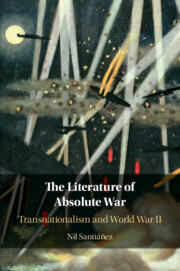Chapter One - The Horror
Published online by Cambridge University Press: 30 April 2020
Summary
Chapter One examines several family resemblances of the literature written on the eastern front. It begins with three traits that are quite common in fiction on absolute war: kaput, the abject, and the writing of cruelty. These three constituents are studied as deployed by Curzio Malaparte in Kaputt (1944) and Theodor Plievier in Stalingrad (1945). Useless suffering and the absurd are the next family resemblances of absolute war writing. Drawing my ideas from the philosophy of Emmanuel Levinas, I relate the useless suffering of civilians and soldiers to the senselessness of absolute war in my analysis of Gert Ledig’s Die Stalinorgel (1955) and Vasily Grossman’s Life and Fate (1980, finished 1959). The examination of the suffering of the victim is followed by the study of radical evil in Jonathan Littell’s Les Bienveillantes (2006). A reading of Walter Kempowski’s ten-volume Das Echolot. Ein kollektives Tagebuch (1993-2005) closes Chapter One. In this last section of the chapter I concentrate on the practice of a “total representation” and the ethics of otherness that underpins Das Echolot. All these family resemblances of absolute war writing are studied against the backdrop of the horror unleashed by war in its absolute degree.
Keywords
- Type
- Chapter
- Information
- The Literature of Absolute WarTransnationalism and World War II, pp. 40 - 105Publisher: Cambridge University PressPrint publication year: 2020

